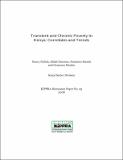| dc.description.abstract | Poverty in Kenya is caused by a number of factors, which include low
agricultural productivity and poor marketing of industrial and agricultural
products, insecurity, unemployment and low wages, poor governance,
misallocation of land, inequality of income and assets, inequality in access to
economic opportunities, lack of education, unfavourable climatic conditions,
HIV/AIDs, gender insensitive properh; rights regimes, and weak democratic
institutions.
Efforts to combat poverty are thwarted by limited political commitment by
government, donor-driven policies that lack local ownership, weak resource
base for policy implementing agencies, exclusion of local organizations from
policy implementation programmes, limited policy direction and lack of
transparency and accountability in some sections of government.
This study is a review of past studies on poverty. The study utilized secondary
data from the Kenya Institute for Public Policy Research and Analysis and
from national and international publications. One of the findings of this paper
is that several studies on poverty have been conducted but little progress has
been achieved in poverty reduction.
The study shows that agriculture, health and education are the sectors that
need to be reformed in order to make substantial progress in poverty reduction.
A short term strategy should aim at raising productivity in agriculture, at
promoting human rights and empowering people, and should target
geographical areas prone to child labour and strengthen institutional capacities.
The study recommends investment in human capital formation at all school
levels and promotion of vigorous economic growth in the long run. There is
also need to design monitoring and evaluation systems to assess effectiveness
of poverty reduction programmes. | en |




